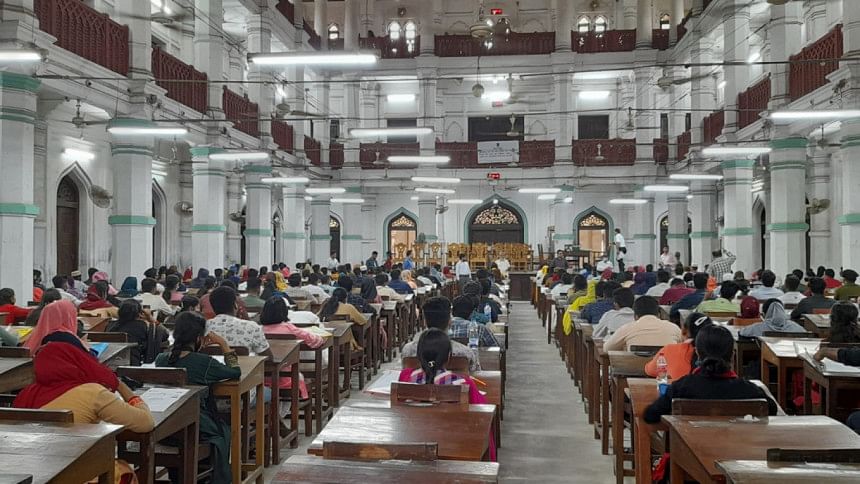The strange failings of admission tests

Ahmed Ittihad Hasib, silver medalist at the 2020 International Mathematics Olympiad and a national level champion, was already going to his classes at the University of Oxford, when Bangladesh University of Engineering Technology (BUET), Bangladesh's top engineering university, told him he was ineligible to even sit for the preliminary exam of its 2021 intake.
I wonder if, had he been alive, Madhusudan Dutt could have written a farce yet greater in intensity than this!
The first public admission exam to be held this year was the medical admission test, an hour-long exam with 100 multiple choice questions on Biology, Chemistry, Physics, English and General Knowledge. Without a calculator. Now, the first question on my exam sheet wanted to know that if mass, temperature and pressure of encapsulated oxygen were x, then what would the root mean square velocity be.
Ahem, no calculator.
Admission tests are supposed to check our aptitude for the degree we're applying for, and although the presence of Chemistry in medicine is justified, Physics is the elephant in the room, as is General Knowledge. And if you also have to memorise the mathematical examples in the book, then what's the point in including math questions at all?
True, studying medicine requires one to have almost photographic memory, and as such the questions test one's retention. Rather than burdening them with unrelated topics, they had better asking more meaningful bits of information.
Although Dhaka University (DU) admission exam for the A Unit is quite admirable, those of the other two units (D unit has been abolished from the next session) aren't quite so. Questions from Bangla and English still steer into absurd grounds, where examinees are asked how many times a word has been used in a poem.
Even after all these years, translations of the questions are still not up to the par. Sometimes the Bangla and the English versions of a question differ so much that students are left wondering which poet wrote these.
General Knowledge forms a huge part of DU admission questions. While answering the D Unit general knowledge questions, I felt an unease slowly welling up in that air-conditioned room: isn't too much happening around the world?
Much more could be said about the absurd problems with admission tests in Bangladesh, but the point remains made. The problems are systemic, and thus changes need to be made to the system.
The SSC and HSC exams are still considered inadequate according to international standards. The marks are more often than not left to the whims of the examiners. GPA 5.00, which was supposed to be rare, has now become commonplace. Ergo, appropriating one's eligibility based on such unreliable parameters is downright unfair. Other, more focused selection process should be introduced, where students' eligibility is assessed through their skills and passions, academics and extra-curriculars; an SAT for Bangladesh. Or a total swap of the curriculum which would rule out the necessity of admission tests. What we have now blurs students' notion of their intellectual predilection, whereas it should've been the other way around.
Admission tests shouldn't just serve as a semipermeable membrane but as a point beyond which the students may aspire to. It should be structured in a way so as to prepare them for the journey ahead, not to exhaust them of all vigour.
Abdullah was a medical student, but now he studies English Literature at the University of Dhaka. Ask him about anaesthesia and Rilke at [email protected]

 For all latest news, follow The Daily Star's Google News channel.
For all latest news, follow The Daily Star's Google News channel. 









Comments